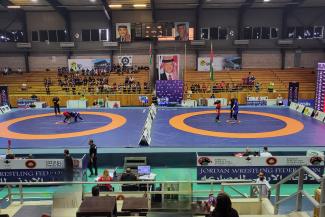In a first, Jordan launches wrestling league Istikal 76
Tuesday, August 30, 2022 - 17:43 By United World Wrestling Press

AMMAN, Jordan (August 30) -- In a first, the Jordan Wrestling Federation conducted a league -- Istiklal 76 -- over two days last week. Wrestlers from all age groups participated in the tournament which was held at the Mu’tah hall in Al Hussein Youth City.
On day one of the competition, Greco-Roman bouts were held before moving to the second day which saw freestyle and women's wrestling bouts. This is also the first time that both men's and women's bouts were held together.
The tournament witnessed wide participation with 380 wrestlers including 28 female wrestlers, the largest number of participants in a local tournament, from 28 clubs and centers.
Overall, 435 fights were conducted following United World Wrestling rules and arrangements of the highest technical and equipment levels. The federation has used UWW's system to manage the tournament including the process of entries, weights, draws, fights and challenge reviews.
Freshly trained referees were part of the tournament and showed exceptional class in decision-making. The second phase of the league will be conducted in September.
“The Jordanian Wrestling Federation was keen to organize a league dedicated to the sport of wrestling, as part of our plans to increase the base of players as we search for fresh talent for the national teams,” Muhammad Al-Awamleh, JWF president, said.
The federation is committed to developing wrestling in the Kingdom and increasing the base by giving wrestlers, referees, coaches and clubs an experience like no other.


 Kenya hosted an Introduction to Referee Course in Nairobi in late October. (Photo: United World Wrestling)
Kenya hosted an Introduction to Referee Course in Nairobi in late October. (Photo: United World Wrestling)
Share your thoughts.
Comments